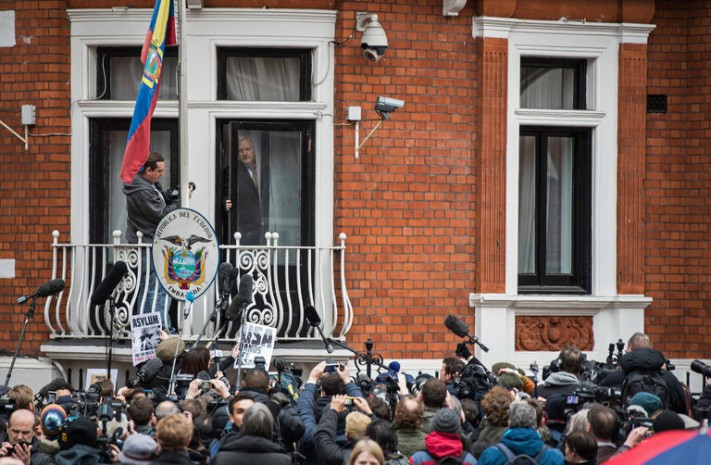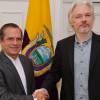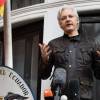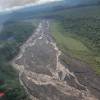Ecuador Internacional
Ecuador Says It Still Backs Assange, but WikiLeaks Says It Cut His Internet
The New York Times 18/10/2016

Julian Assange, founder of Wikileaks, emerging onto the balcony of the Ecuadorean Embassy in London to make a statement in February. Credit Chris Ratcliffe/Getty Images
LONDON — The strange tale of Julian Assange and Ecuador became a little odder on Tuesday, as the Ecuadorean government restated its commitment to providing Mr. Assange political asylum at its embassy in London but refused to even acknowledge a charge by WikiLeaks that it had cut off his access to the internet.
WikiLeaks, founded by Mr. Assange and known for its frequent release of confidential information about governments as well as private organizations and individuals, said on Twitter on Monday that Ecuador had severed Mr. Assange’s internet access Saturday afternoon.
Mr. Assange, who sought refuge in the embassy four years ago and is wanted for questioning by the Swedish authorities, lost internet access shortly after WikiLeaks published information about speeches that Hillary Clinton gave to Goldman Sachs, his organization said.
Mr. Assange and WikiLeaks have recently posted emails hacked from the Democratic National Committee and from John D. Podesta, a senior official in Mrs. Clinton’s presidential campaign, some of which have been highly embarrassing to the Democrats. WikiLeaks published more hacked emails from Mr. Podesta on Monday.
Although Mr. Assange has said that he did not know the source of the WikiLeaks material, the United States government has suggested that the hacking was the work of Russia and that it was intended to help Mrs. Clinton’s opponent, Donald J. Trump.
On Tuesday, WikiLeaks accused Secretary of State John Kerry of pressuring Ecuador in September to cut off Mr. Assange’s access to the internet to stop him from publishing further leaked documents from the Democrats. The group said that Mr. Kerry made the request on Sept. 26 during a private meeting on the sidelines of negotiations seeking peace in Colombia.
The State Department immediately denied the accusation. “While our concerns about WikiLeaks are longstanding, any suggestion that Secretary Kerry or the State Department were involved in shutting down WikiLeaks is false,” the department’s chief spokesman, John Kirby, said in a statement. “Reports that Secretary Kerry had conversations with Ecuadorean officials about this are simply untrue. Period.”
The president of Ecuador, Rafael Correa, is a man of the left, and he recently told the Kremlin-backed broadcaster RT that he would support Mrs. Clinton.
At the same time, he suggested in the RT interview that a victory by Mr. Trump, who has made no secret of his admiration for the Russian president, Vladimir V. Putin, would be good for Latin America because it would, paradoxically, bolster left-wing parties.
“I sincerely believe that it would be better for Latin America if Trump won,” Mr. Correa said. “When did progressive governments come to power in Latin America? During the Bush administration. His primitive policies were rejected so much that it caused reaction in Latin America. Trump would do the same.”
Questions to the Ecuadorean Embassy on Tuesday were met with a polite reference to the mission’s website and to a brief statement.
“In view of recent speculations, the government of Ecuador reaffirms the validity of the asylum granted four years ago to Julian Assange,” the statement said. “We also ratify that the protection given by the Ecuadorean state will continue while the circumstances that led to the granting of asylum remain.”
There was no mention of internet access.
Mr. Assange is the subject of an arrest warrant in Sweden, which wanted to question him about allegations of rape and sexual abuse dating to 2010, to decide whether or not to bring charges.
Mr. Assange, saying that he feared extradition to the United States on espionage charges stemming from the publication by WikiLeaks of secret documents given to the website by Chelsea Manning, broke bail and took refuge in the Ecuadorean Embassy in June 2012. He has been in the tiny embassy since.
Given the statute of limitations, the one allegation Mr. Assange still faces in Sweden is one of rape. He is wanted for questioning but has not been charged.
After long negotiations, he was scheduled to be questioned on Monday by Swedish prosecutors in the presence of an Ecuadorean prosecutor. But Ecuador, at Mr. Assange’s request, postponed that session until Nov. 14, after the American presidential election.
There is no public indictment in the United States of Mr. Assange; if Sweden chooses not to press charges, he would presumably be free to leave the embassy.
Fuente OriginalNotas relacionadas
-
 La situación de Assange es insostenible: Canciller
La situación de Assange es insostenible: Canciller -
 Julian Assange: Ecuador and Sweden in tense standoff over interview
Julian Assange: Ecuador and Sweden in tense standoff over interview -
 Big Data en la geología
Big Data en la geología -
 Don Jorge Añazco, uno de los fundadores de Nueva Loja
Don Jorge Añazco, uno de los fundadores de Nueva Loja -
 Assange tuvo hijos en su estadía en Embajada de Ecuador
Assange tuvo hijos en su estadía en Embajada de Ecuador -
 Continúa monitoreo de actividad de volcán Sangay
Continúa monitoreo de actividad de volcán Sangay
